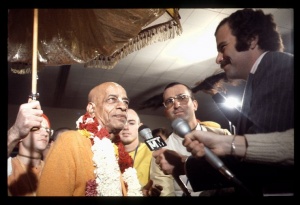SB 1.9.25

A.C. Bhaktivedanta Swami Prabhupada
TEXT 25
sūta uvāca
yudhiṣṭhiras tad ākarṇya
śayānaṁ śara-pañjare
apṛcchad vividhān dharmān
ṛṣīṇāṁ cānuśṛṇvatām
SYNONYMS
sūtaḥ uvāca—Śrī Sūta Gosvāmī said; yudhiṣṭhiraḥ—King Yudhiṣṭhira; tat—that; ākarṇya—hearing; śayānam—lying down; śara-pañjare—on the bed of arrows; apṛcchat—asked; vividhān—multifarious; dharmān—duties; ṛṣīṇām—of the ṛṣis; ca—and; anuśṛṇvatām—hearing after.
TRANSLATION
Sūta Gosvāmī said: Mahārāja Yudhiṣṭhira, after hearing Bhīṣmadeva speak in that appealing tone, asked him, in the presence of all the great ṛṣis, about the essential principles of various religious duties.
PURPORT
Bhīṣmadeva, speaking in that appealing tone, convinced Mahārāja Yudhiṣṭhira that he was very soon passing away. And Mahārāja Yudhiṣṭhira was inspired by Lord Śrī Kṛṣṇa to ask him of the principles of religion. Lord Śrī Kṛṣṇa inspired Mahārāja Yudhiṣṭhira to ask Bhīṣmadeva in the presence of many great sages, indicating thereby that the Lord's devotee like Bhīṣmadeva, although apparently living as a worldly man, is far superior to many great sages, even Vyāsadeva. Another point is that Bhīṣmadeva at that time was not only lying on a deathbed of arrows, but was greatly aggrieved because of that state. One should not have asked him any question at that time, but Lord Śrī Kṛṣṇa wanted to prove that His pure devotees are always sound in body and mind by dint of spiritual enlightenment, and thus in any circumstances a devotee of the Lord is in perfect order to speak of the right way of life. Yudhiṣṭhira also preferred to solve his problematic questions by asking Bhīṣmadeva rather than ask anyone else present there who was seemingly more learned than Bhīṣmadeva. This is all due to the arrangement of the great wheel-carrier Lord Śrī Kṛṣṇa, who establishes the glories of His devotee. The father likes to see the son become more famous than himself. The Lord declares very emphatically that worship of His devotee is more valuable than the worship of the Lord Himself.